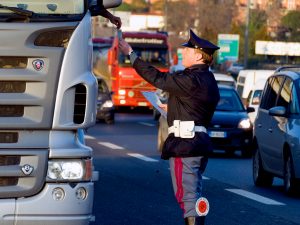As a professional driver, driving a large and potentially dangerous vehicle, you’ll find you and your vehicle is under scrutiny from the police and lawmakers a lot of the time. This is not something to be afraid of or annoyed by because it’s for your own safety as well as the safety of other road users. Of course, you’ll be completing your vehicle checks on a daily basis whenever you’re on a driving job, but you may also find you’re stopped by police while driving and checked for any faults they think your vehicle might have.
If your vehicle is found to be at fault, the police officer or Driver and Vehicle Standards Agency officer will do the only thing they can do in this situation, and issue what is known as a roadside prohibition.

A prohibition means you’re not allowed to drive your vehicle. vehicle prohibitions can be immediate – meaning you must stop driving the vehicle right away – or they can be delayed to give you the opportunity to drive somewhere and get it fixed. Whether a prohibition is immediate or delayed will depend on the sort of fault that has been spotted and how severe or potentially dangerous it has been judged to be.
This serious type of vehicle prohibition happens when either you or your vehicle are considered too dangerous to be on the road altogether. The types of faults or offences that could lead to this sort of prohibition may also be considered criminal, so you may be prosecuted. Your vehicle will be immobilised by the officer and you won’t be able to drive it at all.
A delayed vehicle prohibition is a less serious matter and usually occurs when there’s something minor wrong with your vehicle. You’ll be given up to 10 days to get it fixed, and you’ll be able to drive away in the meantime. Before you can get on the road again, however, it will need to be inspected a second time to make sure it’s compliant.
Overloading your vehicle can also get you slapped with a prohibition, and an immediate one at that. As we’ve already discussed, overloading is a serious offence and can cause harm to your vehicle, you, and other road users. The law will crack down on anyone thought to be overloading their vehicle, and if you’re found to be over your weight limit you’ll probably be given an immediate prohibition until you’ve sorted the problem out. In very serious cases, you could be prosecuted, and you could also lose your job.
This type of vehicle prohibition comes into force when your vehicle doesn’t seem to be up to the standard it needs to be to drive safely. This is for technical reasons, and may be immediate or delayed depending on how serious the fault is thought to be at the time.
If you have strayed from your legal hours or not kept a proper record of them, you can face a prohibition based on driver’s hours alone. This can happen even if there’s nothing at all wrong with your vehicle.
If you carry dangerous goods, you may be issued with a hazchem prohibition. This means you need to make adjustments to your vehicle or load before you can continue safely.
Just fill in your details below and we’ll send you a free theory test practice with.
Just let us know your score...
We reserve the right to contact you in the
future via this email
By Signing up, you agree to our Terms & Privacy Policy
By Signing up, you agree to our Terms & Privacy Policy
By Signing up, you agree to our Terms & Privacy Policy
By Signing up, you agree to our Terms & Privacy Policy
By Signing up, you agree to our Terms & Privacy Policy